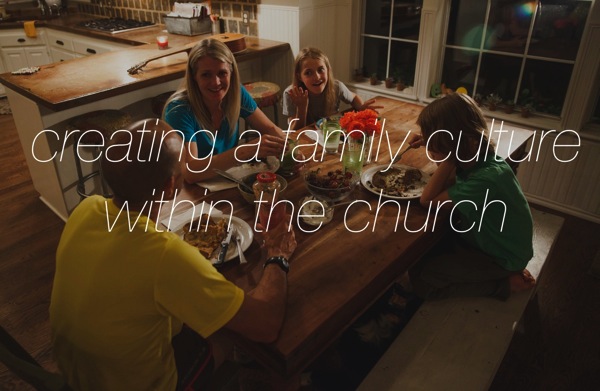 Families can be a bit odd. They all come in different shapes and sizes and usually have their own inside jokes and memories that have been created over the years. There is something significant about the relationships in a family. While friendships may come and go, family often remains. The relational connection between family members is an important, beautiful, and significant relationships.
Families can be a bit odd. They all come in different shapes and sizes and usually have their own inside jokes and memories that have been created over the years. There is something significant about the relationships in a family. While friendships may come and go, family often remains. The relational connection between family members is an important, beautiful, and significant relationships.
As Christians, the same language of family is woven into the way the Bible describes the local church.
Church is family. And this means that as a family, we might be a bit odd. We might have our weird traditions or even family members who creep you out a little bit. But nonetheless, we are family. We are a family who is there for each other, supporting each other, and encouraging each other as we grow.
Family feels welcome.
When I show up at a family party, I always feel welcome. Family is excited to see me, my wife, and my kids. We are greeted as we walk in and we immediately have plenty to talk about. There is no question about how I should act, where I should go, or what is appropriate - it’s family.
Family is welcoming.
Church should feel this way. Do you feel welcome on a Sunday morning? Better yet, if you invited your unchurched co-worker, how would they feel?
And it’s okay if they don’t feel like a close family immediately. It takes in-laws time to adjust to a new family. The same is true when somebody shows up at our churches; they might take a while to grow close. But they will never grow close if they never feel welcome in the first place.
Princess Anna said it best when she suggested, “Love is an open door.”
Our churches need to have an open door, welcoming the people of our neighborhoods, communities, and schools and welcoming them to come and join the family.
Family sticks together.
In Lilo and Stitch the phrase gets spoken, "Ohana means family and family means no one gets left behind.” Calling a group of people family means more than close friends. Family is a group of people that does life together and is involved in all of the mess of life.
More than any other group of people, I know I can be me when I’m with my family.
Because my family knows the real me. They know the things that make me weird. They know what gets on my nerves. They know what makes me emotional. They know the stories about what I was like when I grew up. They saw me at my worst. And they’ve been with me at my best.
Family gets involved in all the good and the bad and is present.
And family is safe regardless of how good the good is and how bad the bad is.
As churches, our desire should be for people to feel the belonging of family. In our congregations, people need to feel the safety to be themselves. People need to feel safe to reveal the mess of their lives and let other people in on it. When that happens, people will have the opportunity to stick with people and have the kind of relationships that are important in a church family.
Family is family.
In order for a church to be family, people also have to be made family. This is important because central to what we do as Christians in our churches is to share with people the message of the Gospel. We share a message with those who are far from God in hopes that they might be adopted into the family of God.
Feeling like family is not enough for us. We want them to actually be family.
And in order for them to be family, they need to believe the message that they’ve been made family.
And we can help with that. We can help them belong to a family as they hear and hopefully in turn believe the message. We can help them know clearly what our family is all about. When a guest comes into our house, we help them not get lost in our traditions, values, and beliefs, but instead translate them so they can follow along and feel like they are a part of the family.
And we do this so that they might believe the Good News. Because we don’t want people to just feel like family. We don’t want people to just stick together. We don’t want people to just feel welcome. We want them to actually be made brothers and sisters in Christ.
 Leaders are learners. And learning means listening to teachers, reading books and articles, and practicing new learnings. As a ministry leader, one of the topics that I love to read about is the subject of leadership. Because I love to read these types of books and think that other leaders should also be reading, here is a list of my favorite leadership books. They are in no particular order, just 20 leadership books that came to mind.
Leaders are learners. And learning means listening to teachers, reading books and articles, and practicing new learnings. As a ministry leader, one of the topics that I love to read about is the subject of leadership. Because I love to read these types of books and think that other leaders should also be reading, here is a list of my favorite leadership books. They are in no particular order, just 20 leadership books that came to mind.
 If there's one thing that is true for all people called to church work, it's that they have passion not only for God, but for their church. If you get a group of young church workers talking, chances are you'll hear them talk about what they love about their church and what they hope to change. As a young church worker, these are some insights that I’d suggest would be helpful for both young and seasoned church workers to know about each other in order to be a healthy team.
If there's one thing that is true for all people called to church work, it's that they have passion not only for God, but for their church. If you get a group of young church workers talking, chances are you'll hear them talk about what they love about their church and what they hope to change. As a young church worker, these are some insights that I’d suggest would be helpful for both young and seasoned church workers to know about each other in order to be a healthy team. Families can be a bit odd. They all come in different shapes and sizes and usually have their own inside jokes and memories that have been created over the years. There is something significant about the relationships in a family. While friendships may come and go, family often remains. The relational connection between family members is an important, beautiful, and significant relationships.
Families can be a bit odd. They all come in different shapes and sizes and usually have their own inside jokes and memories that have been created over the years. There is something significant about the relationships in a family. While friendships may come and go, family often remains. The relational connection between family members is an important, beautiful, and significant relationships. Everybody is a theologian, but
Everybody is a theologian, but  Moses and God
Moses and God  If you are a
If you are a